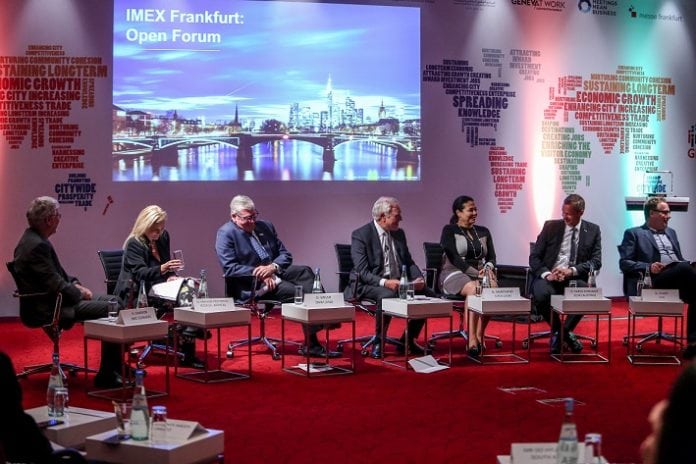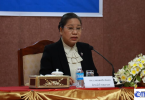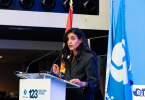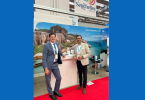What is the biggest challenge for the meetings and events industry? How can an event leave a positive legacy? How can the industry balance concerns around globalization with local concerns? How can the industry achieve sustainability and support city resilience?
These important questions were discussed by a panel of industry leaders during the Open Forum that concluded this year’s IMEX Policy Forum. Formerly known as the IMEX Politicians Forum, the event once again brought together more than 30 politicians and policy makers from around the world to meet with 80 industry leaders and debate issues under the overall theme of ‘The Legacy of Positive Policy Making’.
Their opinions and conclusions on these issues and other major topics are revealed by an incisive summary report by Rod Cameron, Executive Director of the Joint Meetings Industry Council (JMIC) that is now available to download. Each year IMEX makes the report freely available to the global meetings industry to allow CVBs, city governors, destination partners and others to use it to inform their own plans, developments and negotiations.
The report captures the many key points raised and advice shared during all the wide-ranging discussions, and highlights many insights that will prove valuable to politicians, policy makers and industry executives working for national and regional organizations worldwide.
The creation of a national meeting strategy
‘The creation of a national meeting strategy’ was the focus of a discussion in the opening session for national government representatives. Delegates recognized the need for an integrated approach to optimize synergies and avoid conflict with policy and regulation together with the overarching importance of consultation with local government. They also commented on the need to recognize and acknowledge the social importance of medical meetings and events and, frequently, their knowledge transfer.
The Evolution of Cities in the Meetings Industry
Delegates from many major cities took part in a workshop on ‘The Evolution of Cities in the Meetings Industry’. A typically thought-provoking opening presentation by Professor Greg Clark included the view that the relationship between cities and the industry evolves in cycles or phases that are catalyzed by relevant developments or major events. Six major cities – Sydney, Singapore, Dubai, Tel Aviv, Cape Town and Barcelona – then presented revealing and very different case studies showing the evolution of their meetings business. The report summarizes all these presentations.
Gloria Guevara Manzo – three challenges
In the opening presentation introducing the Open Forum, Gloria Guevara Manzo, President & CEO of the World Travel & Tourism Council, focused on the top three challenges facing the travel and tourism industry, based on worldwide research.
On security and safety she highlighted how the industry has great potential for growth if it can overcome issues such as this by greater collaboration and the use of biometrics. Another of the likely inhibitors to growth is the increasing occurrence of travel sector crises whose impacts can be reduced through greater crisis preparation. Finally, she highlighted sustainability and the need for a private, public, community approach to development.
Open Forum Discussions
The introduction of a new panel format in the Open Forum stimulated lively and thought-provoking discussions. The question of the biggest challenges to the growth of the industry generated a broad range of opinions, particularly the need to be recognized as an independent sector beyond tourism and with a clearer story more aligned to economic development, knowledge and innovation.
The debate on legacy revealed the vast range of potential different positive legacies that an event can leave behind while the importance of genuine engagement with local cultures was one of many points raised in the discussion about balancing globalization with local concerns. This was reflected further in the consideration of city resilience when the debate recognized the need for the industry to be integrated better with local communities.
Each topic was initiated by contributions from the panel: Rod Cameron, Joint Meetings Industry Council (JMIC); Nina Freysen-Pretorius, International Congress and Convention Association (ICCA): Don Welsh, Destinations International (DI): Nan Marchand Beauvois, United States Travel Association (USTA): Dieter Hardt-Stremayr, European Cities Marketing (ECM) and Professor Greg Clark.
Conclusions
Among his many observations on the day’s discussions, Greg Clark thought the meetings industry was more akin to financial services or academia than tourism in that it functions as a broad enabler of business. He said it is seen as too bound up in tourism and instead needs to better define its own story and tell it clearly, highlighting its benefits, leveraging events such as Davos and showing positive impacts through good case studies.
Carina Bauer, CEO of the IMEX said: “As a result of the many outstanding contributions and the new format of the day, the quality of content and debate were first class.
“The IMEX Policy Forum continues to drive the industry forward, building its reputation in government as a powerful catalyst for economic development.”
The IMEX Policy Forum’s advocacy partners are Association Internationale des Palais de Congres (AIPC), European Cities Marketing (ECM), ICCA, the Joint Meetings Industry Council (JMIC), The Iceberg and UNWTO. The annual Forum is sponsored by Business Events Australia, Business Events Sydney, German Convention Bureau, Geneva Convention Bureau, Saudi Exhibition & Convention Bureau, Messe Frankfurt and the Meetings Mean Business Coalition.






